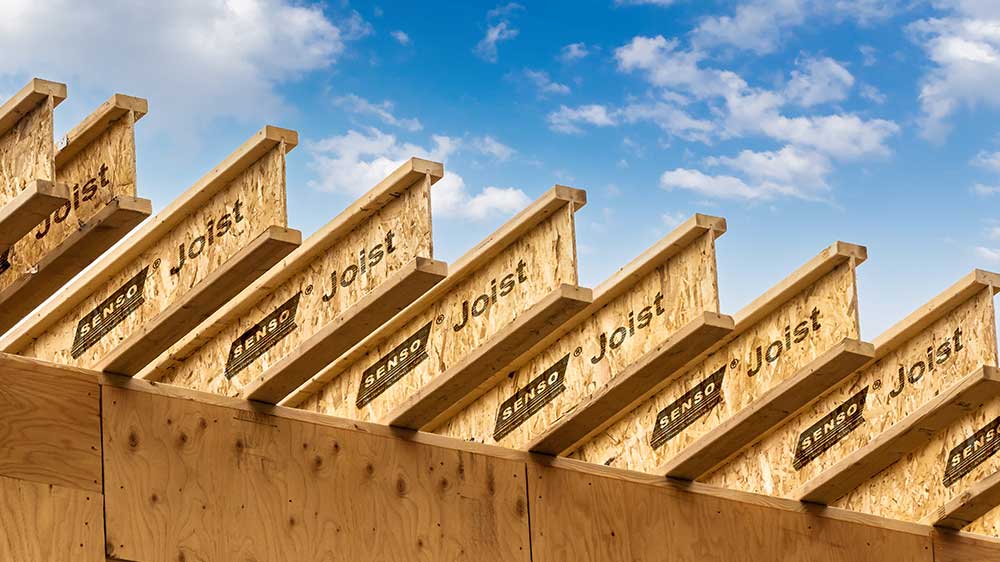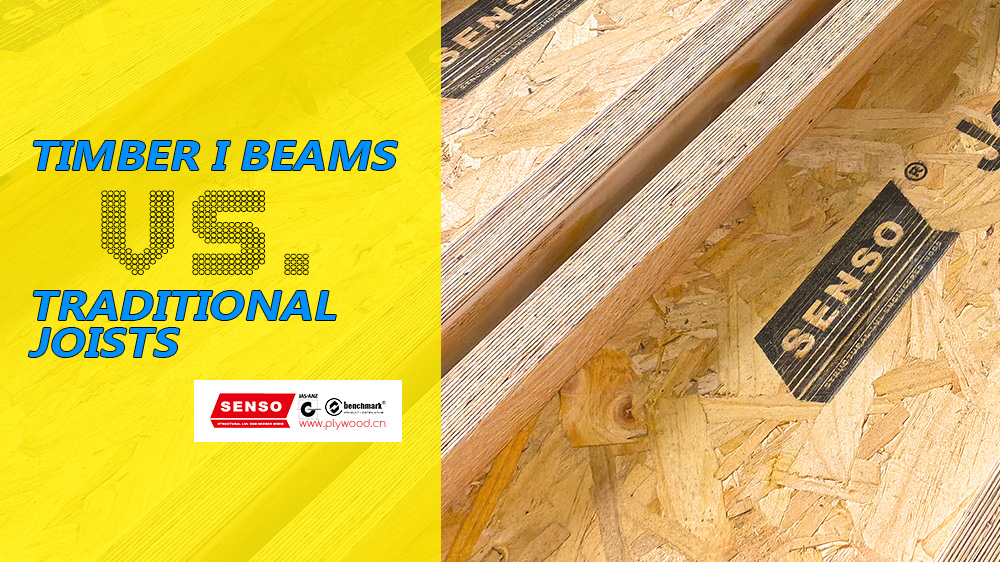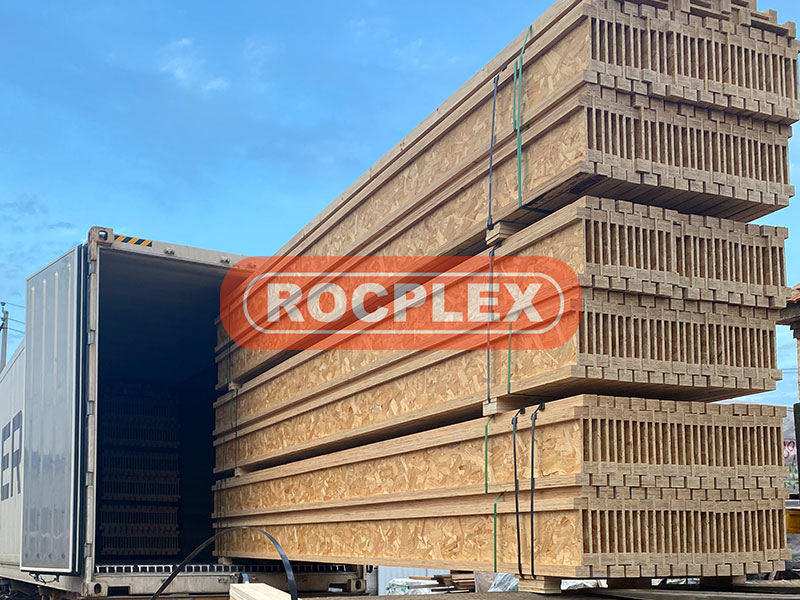Timber I Beams
timber I beams, often referred to as engineered wood floor joists, are crucial structural components in construction. They feature a distinct “I” shape that provides remarkable strength and stiffness, ideal for floor and roof framing. Crafted from engineered wood products, timber I beams surpass traditional lumber in durability, uniformity, and resistance to twisting or shrinking. Their lightweight nature facilitates easier handling and quicker installation, significantly reducing overall construction time. Brands like SENSO I Joist have elevated timber I beams’ popularity by ensuring precise manufacturing standards. Builders worldwide now prefer these beams for their versatility, consistent quality, and environmentally friendly attributes.

Timber I Beams: Superior to Traditional Joists
When constructing floors and roofs, timber I beams have increasingly replaced conventional lumber joists. These engineered wood floor joists provide uniform strength and stability, essential in residential and commercial projects. Unlike traditional joists, timber I beam maintain precise dimensions, ensuring fewer issues during installation.
Builders prefer timber I beam for multiple reasons. Firstly, these engineered beams weigh less, making transportation and handling simpler on construction sites. Secondly, the consistent dimensions offered by brands like SENSO I Joist eliminate the common issues associated with traditional wooden joists, such as warping or shrinking.
Why Choose SENSO I Joist?
Among the variety of timber I beam available, SENSO I Joist products stand apart. Engineered with precision, these I-Joists provide unmatched reliability and structural integrity. Each SENSO beam undergoes rigorous quality control, ensuring uniform strength and durability. This meticulous process reduces onsite problems significantly.
Customers choosing SENSO timber I beam often experience fewer callbacks and warranty issues. The predictable and uniform behavior of engineered wood floor joists means safer, more reliable flooring systems. In turn, builders enhance their reputation by consistently delivering high-quality projects.
Cost Comparison: timber I Beams vs. Traditional Lumber
Initially, timber I beam might appear costlier compared to conventional lumber joists. However, their long-term benefits outweigh the initial investment. Engineered wood floor joists from SENSO reduce labor expenses significantly by simplifying installation. Workers save time since these beams require minimal adjustments during setup.
Additionally, the high precision and dimensional stability of timber I beam mean fewer materials wasted on corrections or replacements. Traditional wooden joists often warp or twist, leading to extra expenditures. SENSO timber I beam, however, ensure project timelines stay on track, ultimately controlling budget overruns.
Structural Benefits of timber I Beams
timber I beams offer unique structural advantages over traditional lumber. Their engineered design provides high load-bearing capacity without compromising weight. Engineered wood floor joists efficiently handle heavier loads, making them ideal for both residential and commercial buildings.
Furthermore, SENSO engineered I beams exhibit superior resistance to moisture and environmental conditions. This feature enhances their lifespan and structural integrity. Builders using timber I beam enjoy peace of mind knowing that their construction meets or exceeds industry standards, delivering long-lasting performance.
Timber I Beams: Sustainability Matters
In today’s eco-conscious market, sustainability becomes a crucial factor influencing purchasing decisions. timber I beam, particularly SENSO I Joists, meet stringent environmental guidelines. Engineered from sustainably harvested wood, these beams minimize waste through efficient manufacturing processes.
Unlike traditional wooden joists, timber I beams optimize resource use, reducing environmental impact. Builders and homeowners benefit from using products that support green building standards, enhancing project value and marketability. SENSO timber I beam not only promise strength and durability but also align construction practices with global sustainability goals.
Installation Efficiency: timber I Beams vs. Wooden Joists
Installation efficiency significantly impacts overall construction productivity. timber I beam, due to their lightweight and precise dimensions, simplify and accelerate the installation process. Traditional wooden joists, by contrast, often present issues requiring adjustments and additional labor.
SENSO engineered wood floor joists streamline construction operations. Workers appreciate the ease of handling and the reduced need for onsite modifications. This efficiency translates directly into shorter project timelines, fewer work-related accidents, and increased profitability for builders.
Addressing Common Misconceptions about timber I Beam
Despite their widespread use, some misconceptions about timber I beam persist. One common myth is that engineered wood floor joists lack the strength of solid lumber. Contrary to this belief, timber I beams like those from SENSO consistently outperform traditional joists in structural tests.
Another misconception suggests timber I beam easily fail under moisture exposure. However, SENSO engineered I beams undergo advanced treatment processes, enhancing their moisture resistance. Proper installation and basic maintenance further extend the durability and lifespan of these beams, countering misconceptions effectively.
Applications of timber I Beam in Modern Construction
Builders worldwide adopt timber I beam across various applications. Residential builders particularly favor engineered wood floor joists for multi-story homes due to enhanced load-bearing abilities. Commercial construction equally benefits from these beams, especially in office buildings and retail complexes. SENSO I Joist products fit seamlessly into diverse construction scenarios, from expansive flooring systems to complex roof structures.
Additionally, wooden I beams support modern architectural designs demanding precision and strength. The flexibility provided by SENSO engineered I beams enables unique building features without compromising structural integrity. Consequently, architects and engineers frequently recommend timber I beams as optimal solutions for challenging projects.
Maintenance Advantages of Timber I Beams
Proper maintenance of structural components ensures building longevity. timber I beam from brands like SENSO significantly reduce maintenance requirements compared to traditional wooden joists. Engineered wood floor joists resist common issues such as warping, shrinking, or cracking. Their consistent quality and advanced manufacturing processes provide greater resilience against moisture damage or pest infestations.
Homeowners and commercial building owners appreciate lower maintenance costs associated with timber I beams. Fewer repairs and minimal replacements translate into substantial long-term savings. Thus, engineered wood floor joists offer financial advantages throughout a structure’s lifecycle.

Timber I Beams: Ensuring Floor Stability
Floor stability ranks among the highest concerns in construction projects. Traditional joists frequently contribute to uneven floors due to inconsistent material quality and dimensions. timber I beams effectively eliminate this issue, providing uniformly flat and stable surfaces. Engineered wood floor joists by SENSO guarantee precise alignment, enhancing both structural reliability and occupant comfort.
Wooden I beams also reduce floor vibration, a common concern in multi-story buildings. The enhanced stiffness of engineered I beams ensures quieter, more comfortable interiors. Consequently, homeowners increasingly demand timber I beam for better quality living environments.
Timber I Beams and Safety Compliance
Meeting safety standards is paramount in construction. timber I beams, particularly SENSO I Joists, undergo rigorous testing to meet global safety requirements. Engineered I beams surpass traditional lumber joists in fire safety tests, structural load assessments, and resistance to environmental damage.
Construction firms relying on SENSO timber I beam demonstrate adherence to safety regulations confidently. These beams offer superior structural integrity and enhanced safety for building occupants. Selecting engineered wood floor joists ensures compliance with local building codes, reducing liability risks for developers and builders.
Customer Feedback: Why Timber I Beam Lead the Market
Customer testimonials consistently highlight the advantages of timber I beams. Builders regularly praise the ease of installation, dimensional consistency, and reliable performance provided by engineered I beams. Wholesalers also benefit from reduced handling costs and simplified inventory management due to predictable sizing.
Feedback from projects utilizing SENSO timber I beam demonstrates improved client satisfaction. Reduced callbacks, quicker completion times, and enhanced building quality strongly influence repeat business. timber I beam thus significantly improve overall customer experiences and market reputation.
Environmental Impact: Timber I Beams vs. Steel Joists
timber I beams hold significant environmental benefits compared to steel alternatives. Engineered wood floor joists like those from SENSO require considerably less energy during production, generating fewer greenhouse gases. Additionally, sustainable harvesting practices ensure renewable wood sources replenish continually.
In contrast, steel joist manufacturing involves intensive energy consumption and higher emissions. timber I beam offer builders a compelling eco-friendly alternative, aligning construction projects with sustainable development goals. The environmental advantage increasingly drives the popularity of engineered wooden I beams in global markets.
Timber I Beams in Remodeling and Renovations
timber I beams also excel in remodeling and renovation projects. Their lightweight nature and ease of installation simplify complex retrofit tasks. Builders frequently choose engineered wood floor joists from SENSO to reinforce existing structures efficiently.
Wooden I beams reduce structural loads on older buildings, ensuring safer and more effective renovations. Their adaptability allows architects and contractors to address unique challenges posed by historical or complex structures. Thus, timber I beam effectively bridge the gap between modern standards and existing architectural integrity.
Innovations and Future Trends in Timber I Beam
Technological advancements continually improve timber I beam. Innovations in adhesive technology, moisture resistance, and structural engineering regularly enhance the performance of engineered wood floor joists. SENSO actively invests in research, consistently developing stronger, lighter, and more versatile I beams.
Future trends indicate increasing adoption of timber I beam in large-scale commercial and industrial projects. Improved fire retardants, enhanced moisture barriers, and advanced engineering techniques further expand potential applications. timber I beam, driven by ongoing innovation, promise continued growth and broader adoption across diverse construction sectors.
Making the Right Choice: Timber I Beam for Your Project
Selecting the appropriate structural component significantly impacts construction success. timber I beam offer substantial advantages over traditional wooden joists, including cost-effectiveness, strength, environmental sustainability, and ease of installation. Specifically, SENSO engineered wood floor joists stand out by providing exceptional quality and unmatched performance.
Whether planning residential, commercial, or renovation projects, timber I beams deliver superior outcomes. Builders choosing SENSO benefit from reliability, safety compliance, and long-term durability. Making informed decisions by selecting timber I beam ensures robust, efficient, and sustainable construction results.

Timber I Beams Transforming the Construction Industry
timber I beams undeniably represent the future of structural framing. Superior engineering, precision manufacturing, and consistent quality make engineered wood floor joists indispensable in modern construction. SENSO I Joists specifically address critical industry pain points, offering solutions to installation challenges, dimensional inconsistencies, and structural integrity issues.
Globally, construction professionals increasingly recognize timber I beam advantages. Reduced environmental impact, streamlined installation processes, and outstanding long-term performance further enhance their market appeal. Ultimately, timber I beams, especially SENSO products, elevate construction standards, providing safer, stronger, and more sustainable buildings worldwide.
Post time: May-19-2025

